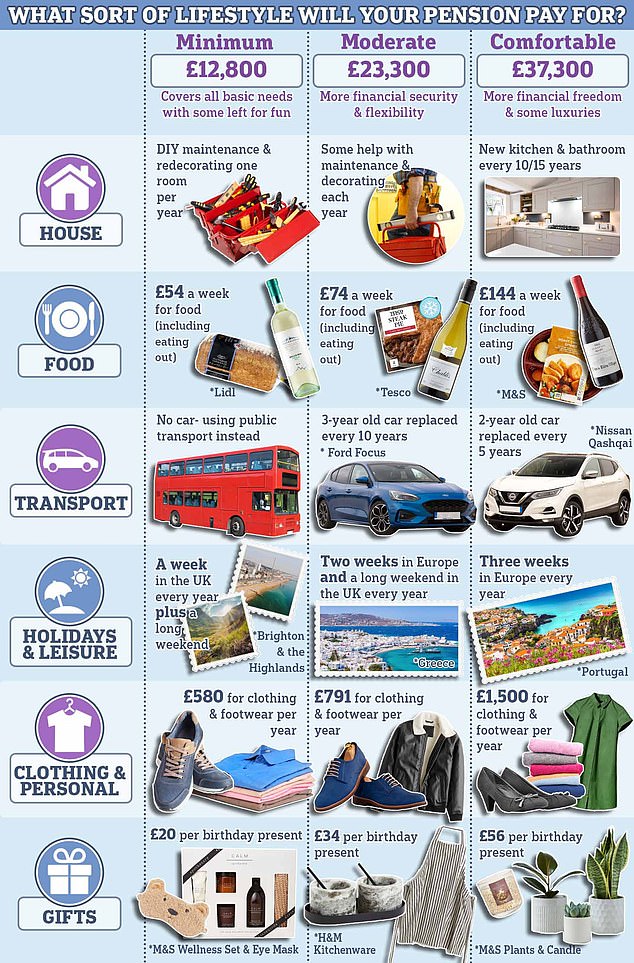Couples sharing pension decisions ‘likely to be better off in old age’
>
Couples who make decisions about retirement savings together are more likely to have a richer pension, new research shows.
More than half of couples who do so are on their way to a “moderate” retirement, and nearly one in five are living comfortably into old age, according to a survey of household finances.
Financial experts say a collaborative approach to retirement will leave couples better off as they retire — though there are some potential problems with taxation, and there are circumstances where it makes financial sense to focus on the higher earner pension.
Plan ahead: More than half of couples who save together are on their way to a decent retirement
Analysis of household data by Hargreaves Lansdown found that about 51 percent of those where couples make retirement decisions together are likely to earn “moderate” retirement income.
That compares to 45.5 percent where someone said their partner makes retirement decisions, and 42 percent where someone did it alone. Overall, 42 percent of all households, including singles, are on their way to moderate retirement income, according to Hargreaves’ research.
A moderate income means you have £34,000 a year between you, including state and private pensions, and is based on the cost of several baskets of goods and services such as food and drink, transport, holidays, clothing and social outings.
>> How couples who save together maximize their retirement: read eight tips from the experts
Couples need £19,900 a year for a basic lifestyle and £54,500 to be comfortably free, according to the influential Retirement Living Standards report from the Pensions and Lifetime Savings Association industry group.
Single people will have to save harder on their own to achieve the same standard of living as couples have combined spending power and possibly two state pensions, worth £10,600 a year from next month if you qualify for the full rate.
What do couples need to save for retirement?

Retirement income needs for couples, according to the Pensions and Lifetime Savings Association
Hargreaves found that 18 percent of couples who make retirement decisions together can achieve a “comfortable” retirement based on the PLSA measure.
That compares to 14 percent where someone said their partner made the decisions, and 15 percent where someone did it themselves. Overall, 15 percent of households are on their way to a comfortable lifestyle after retirement.
“When it comes to financial decision-making, two heads are better than one,” says Helen Morrissey, head of pension analysis at Hargreaves Lansdown of the study.
“It’s easier for a couple to meet these standards than their single peers, but it helps if you plan together.”
‘By having an open and honest conversation with your partner, you get an overall picture of your finances and you know which gaps need to be closed. You can find out what everyone’s pension expectations are and make a plan that suits you.’

Helen Morrissey: Having an open and honest conversation with your partner will give you an overall picture of your finances
Morrissey says leaving big financial decisions to one partner often means leaving the other in the dark and severely disadvantaged if the relationship ends or they are unexpectedly robbed.
She adds that it’s extremely important not to neglect one partner’s retirement planning to the detriment of the other.
‘By helping both partners build up their pensions, both partners continue to benefit if they stay together and receive a valuable income guarantee if they separate.’
We’ve gathered tips here for taking full advantage of pensions as a couple, explaining how you can take advantage of all the benefits available – for example, if a partner cares for the children unpaid instead of doing paid work.
However, there are pitfalls – especially in the tax area. With the pension tax reduction, anyone can save for retirement from untaxed income, based on your income tax rate of 20 percent, 40 percent, or 45 percent.
If you are a higher taxpayer, you will therefore receive a higher deduction on your own pension, while a partner who is subject to basic tax or pays no income tax at all will receive a lower deduction.
Financial experts therefore recommend that couples maximize their own pot individually and then consider whether contributing to each other’s will be tax-efficient.
The Hargreaves study of couples’ retirement savings habits is drawn from the Saving and Resilience Barometer, which was compiled in collaboration with the forecasting firm Oxford Economics.
It is based on data from the Office for National Statistics’ Wealth and Asset survey – which draws its information from 10,000 households – plus other data from official sources.
Hargreaves says the barometer is built around five pillars of financial behavior: managing your debt, protecting your family, saving for a rainy day, planning for later life, and investing to get more out of your money.
What should single people save for retirement?

Need for retirement income for single people. Scroll down to find out what couples need for a decent old age (Source PLSA)
Some links in this article may be affiliate links. If you click on it, we may earn a small commission. That helps us fund This Is Money and use it for free. We do not write articles to promote products. We do not allow any commercial relationship to compromise our editorial independence.
